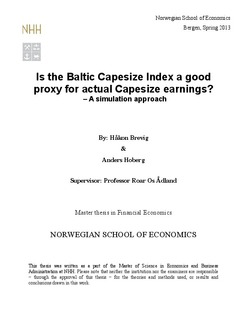Is the Baltic Capesize Index a good proxy for actual Capesize earnings? : a simulation approach
Master thesis
Permanent lenke
http://hdl.handle.net/11250/169833Utgivelsesdato
2013Metadata
Vis full innførselSamlinger
- Master Thesis [4372]
Sammendrag
The purpose of this dissertation is to investigate if the Baltic Capesize Index is a good proxy for
actual Capesize earnings and why they deviate. The results may implicate if forward freight
agreements are suitable for revenue management in practice. This because forward freight
agreements are bought and held through maturity, and by definition, forward prices will converge
to spot prices as they reach maturity. What matters is therefore the difference between spot index
and actual earnings.
The dissertation is based on a simulation approach where both single linear regression and the
dollar-offset method are used to evaluate how good proxy the Baltic Capesize Index is. Our
findings indicate that actual earnings are most affected by the basis risks geography and timing,
and the “lag” before changed market conditions are reflected in actual earnings. Linear regression
and the dollar-offset method are ambiguous whether the Baltic Capesize Index is a good proxy
for actual Capesize earnings. To conclude whether the Baltic Capesize Index is a good proxy it is
therefore necessary to conduct more research on which methods that are appropriate within
shipping.
